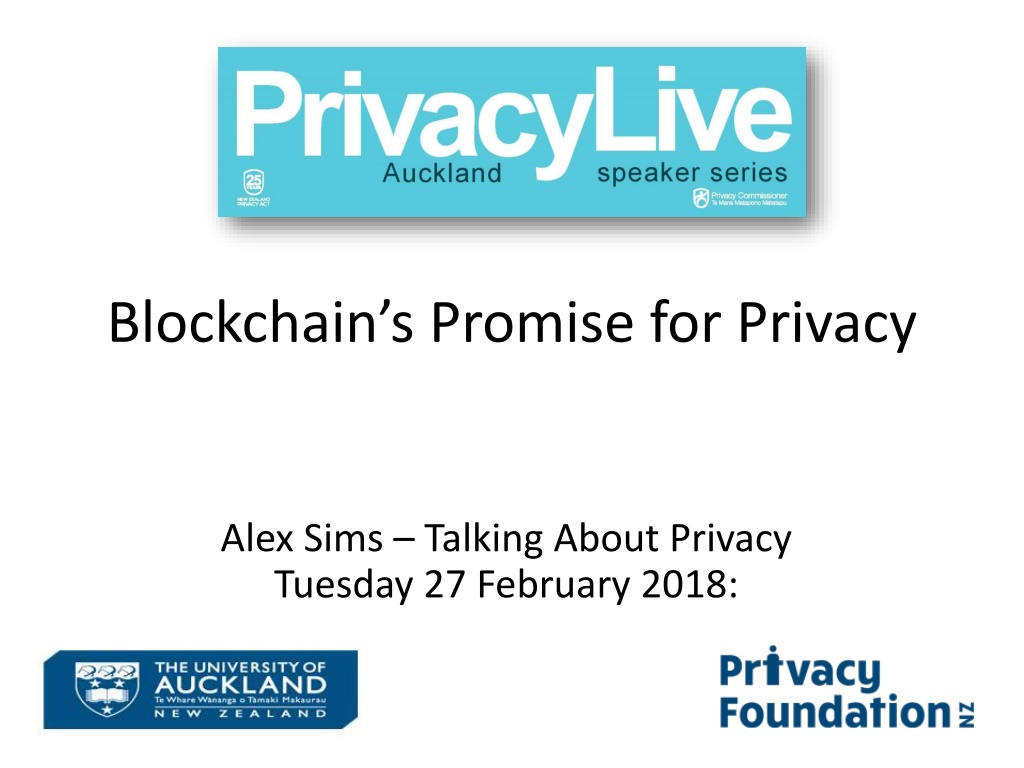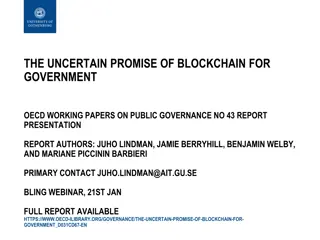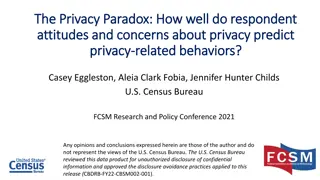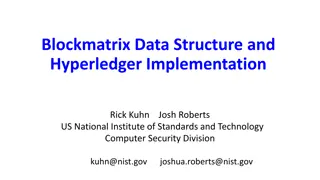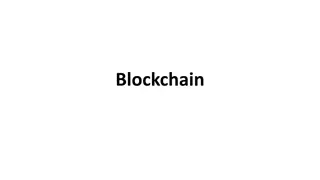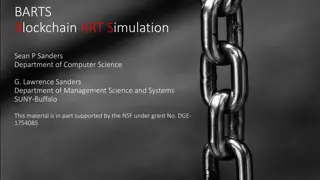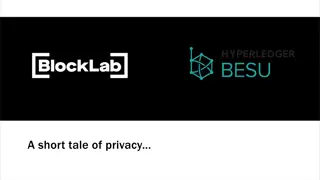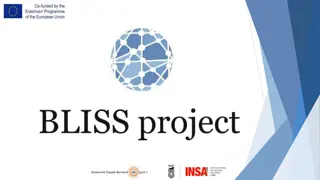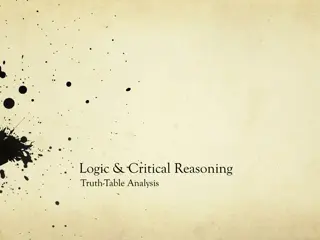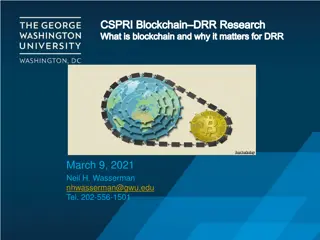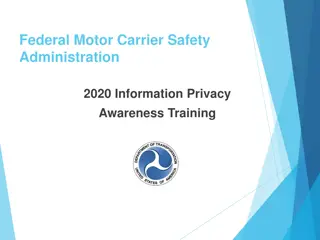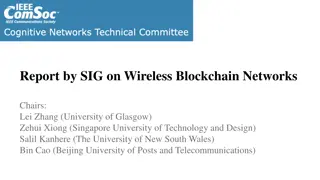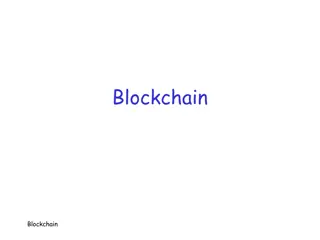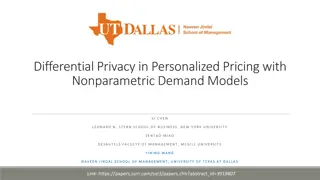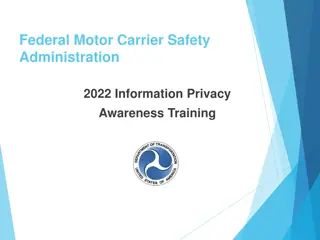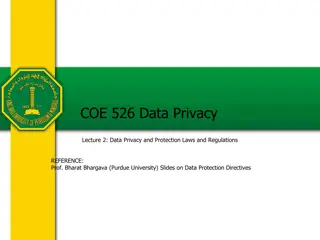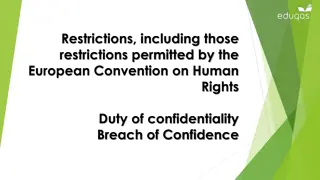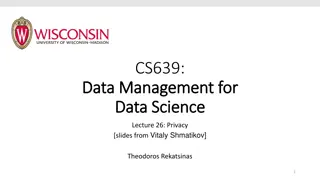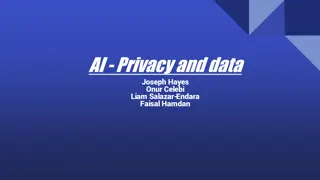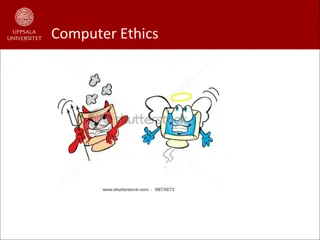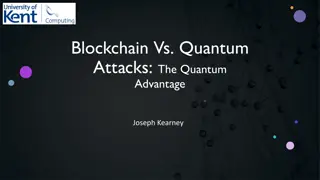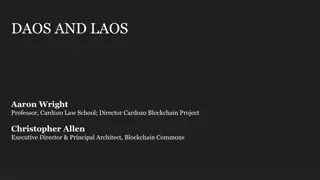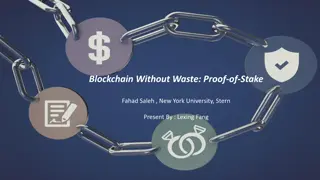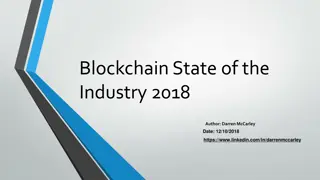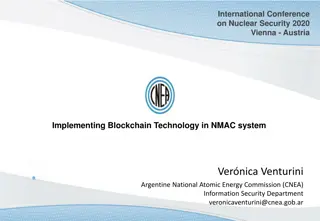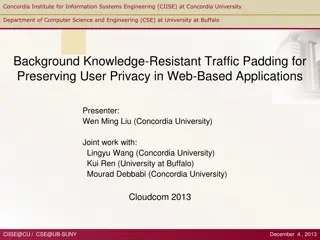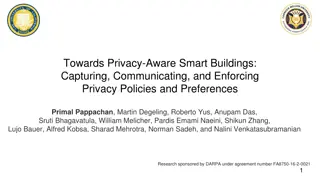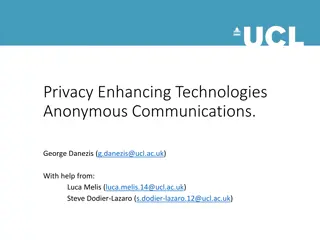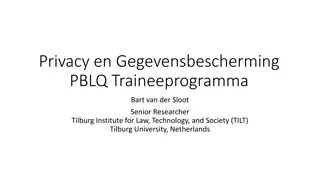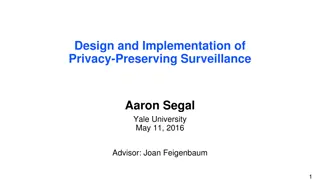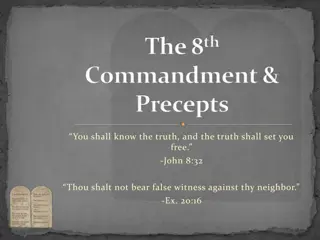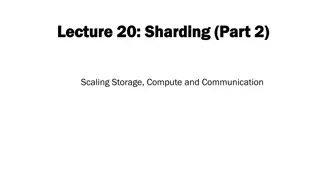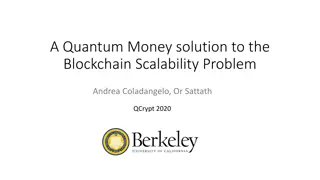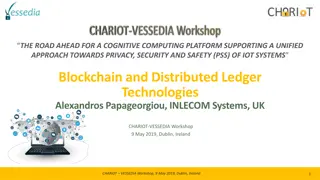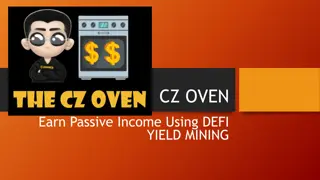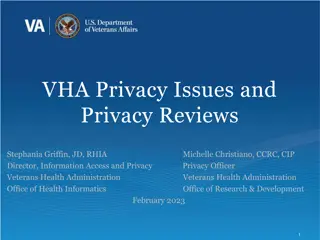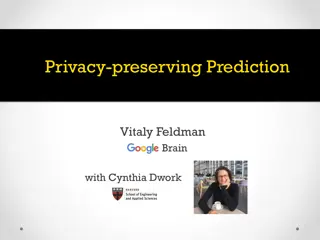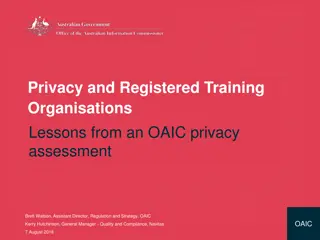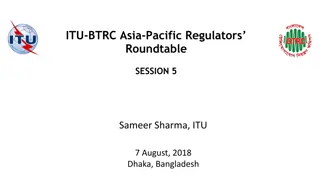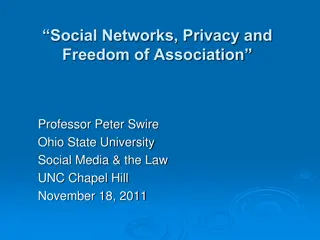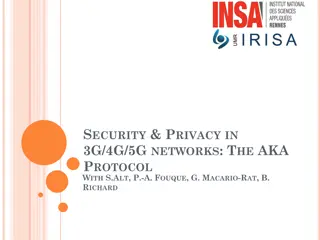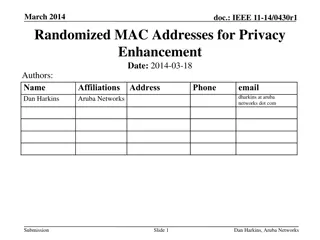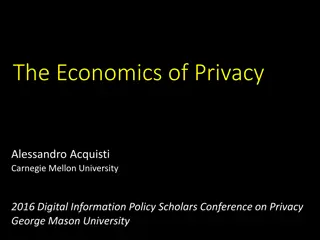Unveiling the Truth about Blockchain: Privacy, Technology & Potential
Delve into the nuances of blockchain technology, highlighting its promise for privacy as discussed by Alex Sims. Gain insight into the misconceptions surrounding blockchain, its relationship with privacy issues, and the evolving landscape of distributed ledger technology. Explore the definition of blockchain, key terminology, recent developments, and the diverse applications of this innovative system.
Download Presentation

Please find below an Image/Link to download the presentation.
The content on the website is provided AS IS for your information and personal use only. It may not be sold, licensed, or shared on other websites without obtaining consent from the author. Download presentation by click this link. If you encounter any issues during the download, it is possible that the publisher has removed the file from their server.
E N D
Presentation Transcript
Blockchains Promise for Privacy Alex Sims Talking About Privacy Tuesday 27 February 2018:
Most of what you have heard about blockchain is wrong
Distinct parallels with blockchain and the early days of the internet
Outline of talk Defining (and therefore explaining) what blockchain is Potential privacy issues with blockchain Why absolute privacy does not exist How the privacy issues are being resolved Why privacy is broken at the moment and how blockchain can in fact help people regain their privacy The law is the problem rather than the technology
Definition of a blockchain A database so secure it can be made public where altering a copy of the database has no effect & transactions can only be appended, never deleted or updated Underpinned by a Peer to Peer protocol that strictly enforces transaction validity prior to writing to the database
Some terminology Blockchain = public and distributed open source Distributed Ledger Technology (DLT) = permissioned or private closed/proprietary but can be open source (permissioned = industry/consortium only permitted to write and view, eg Hyperledger Frabric) Private = one person/organisation has ability to write) To not confuse everyone will use blockchain for both public, permissioned and private Once move away from public blockchains you lose many of the benefits of Blockchain ie becomes inherently less secure
More recent developments If you think blockchain is hard to get your head around, blockchain is now boring there are other systems being developed, ie: IOTA tangle Hashgraph Rchain Etc, etc
Uses of blockchain Currently most people think blockchain = bitcoin = criminal activity Or cryptocurrencies and speculation But people (including governments) are working on uses of blockchain in almost every industry: Supply chains including provenance Health records Distributed electricity grids Education/credential certificates Insurance Registry systems, including land, cars, IP etc
Just to scare everybody and this is not science fiction Blockchain enables programmable money: Can put actual conditions on money, eg can only spend at certain preauthorized places, and/or can t be used to buy certain things like alcohol (so more sophisticated than giving a card or voucher etc) Those conditions could continue to apply as the money circulates, or could automatically be removed once the first transaction occurs or at a later date If wanted could track and even control that money as it works its way through the economy Eg, GovCoin has been trialed by the UK Government with the unsurprising criticisms https://theconversation.com/why-a-blockchain-startup-called-govcoin-wants- to-disrupt-the-uks-welfare-state-88176
Perfect Privacy isnt realistic While some people would like perfect privacy that isn t possible in all settings, eg: If walk down street can t ask people not to look at you or if in the middle of Newmarket, not to take photos of you and your children If want to keep all financial transactions secret then have to use cash for everything, becoming harder to do so: try living without a bank account, eg ask your employer to pay you in cash each fortnight! Difficult to live without electricity and running water (you need to disclose who you are to get services )
Whats the (potential) issue with privacy? A public blockchain is a database that everyone can see into! But not necessarily as simple as everything being seen Next slide uses Bitcoin as an example
Bitcoin and privacy You don t own bitcoin Instead bitcoin is recorded against a public key (a meaningless string of numbers that does not contain any identifying features of its owner), you can go online and see how much money belongs to a public key Public keys are a bit like a bank account number (difference is that you can see all the bitcoin held by that public key and the transactions made to and from it) Knowing the public key is not enough to spend it, you need to know the private key. Control over the private key is vital! The hacks of bitcoin and other cryptocurrencies have been due to people getting hold of private keys, eg when a third party such as an exchange is hacked or a custodian of the private key uses it for their own puposes.
Bitcoin and privacy Just by looking at the bitcoin blockchain you don t know who owns what and who is transferring and receiving what But it is possible in many cases to work out who is behind a public key eg FBI officers who extorted Bitcoin from Silk Road participants were tracked down But, now can use HD (hierarchical deterministic) wallets that generate a new public key each time that wallet is used so send and receive so that transactions can t be tracked = Technology is fixing privacy and other issues https://www.forbes.com/sites/laurashin/2016/11/01/federal-prosecutor-kathryn- haun-on-how-criminals-use-bitcoin-and-how-she-catches-them/
Other ways of protecting privacy Zk-snarks, (zero-knowledge proof technology) Used in Monaro and Zcash (pricacy coins) Bulletproofs Also/and can use other forms of encryption so that some people can see some parts and others can t see them even easier if using permissioned blockchains (but not impossible if using a public blockchain)
Other concerns about privacy Right to be forgotten If information is on a blockhain it is immutable and is there for all time Well yes that is the current design, but could have it so that the information is automatically deleted after a certain time: But may not want that for say money With permissioned blockchains would be easier to have information deleted as does not suffer so much from a decentralised system But if decentralised system run as a well functioning DAO then possible for information to be removed if there is a court order etc.
Blockchains possible effects? While initially blockchain looks like a real threat to privacy, carefully handled blockchain could offer the same or even better privacy protection than the current systems
Why and how is current privacy protection so bad?
the law is not the problem, it is the practical reality, ie real life that gets in the way!
Why and how is current privacy protection so bad? To receive many services/goods etc (including healthcare, education, a roof over your head etc) you are required to provide personal information to each provider, including: Name, address (and often proof of address), sometimes birth date, copies of government identification, eg passport/drivers license/birth certificate, bank/credit card information Your personal information is held by tens if not hundreds of different agencies just takes one to be compromised and your personal information is out there for others to mis(use)
Current system is woeful You don t control your data, the people who hold it do Blockchain can change that Just some of the biggest data breaches of the 21 century, numbers of accounts (and thus people): Equifax (143 million Adult Friend Finder (412 million) Anthem (78 million) eBay (145 million) JP Morgan Chase (76 million) Yahoo (3 billion) Target Stores (110 million) US Office of Personnel Management (77 million) https://www.csoonline.com/article/2130877/data-breach/the-biggest-data-breaches- of-the-21st-century.html
Privacy can be enhanced by not holding personal information Benefits of not keeping some customer data has been recognised, ie merchants wanting to receive credit card payments have to be PCI complaint - the credit card companies have forced PCI compliance on the banks which in turn require it from their customers Easiest way to be PCI complaint is not to store credit card numbers, have all payments done by third party, ie PayPal but even then not secure http://bgr.com/2016/01/04/paypal-account-security-hackers/
Federated v Self Sovereign Identity Federated can access services etc through existing account, ie when sign in using Facebook or Google etc (= it is handy, but it gives Facebook and Google etc even more control over our lives ) Self Sovereign you control your information and grant others the right to check that information is correct Eg, if asked for ID to prove over 18, request is made, is person over 18 answer will be yes or no So no need to hand over driver s license or passport that contains lots of personal information you may not want others to see https://medium.com/@gomedici/21-companies-leveraging-blockchain-for-identity- management-and-authentication-d09d88e3a4bf
But, surely having one place where all information is makes that place a more attractive target to hack? Need to move out of old fashioned/traditional thinking of centralised organisations Can have each person and only that person holding the information, for example, Civic With Civic the information is hashed (and thus encrypted) to your phone so even if your phone is compromised only your information is compromised, not millions of people s information https://www.civic.com
Law may be the obstacle GDPR (General Data Protection Regulation) comes into effect on 25 May 2018 Blockchains, especially decentralised ones, do not work well with GDPR Any NZ business that handles the personal data of EU residents has to have a compliance plan in place There are potential workarounds so can use blockchain and be complaint with GDPR, but many of the benefits of blockchain will be lost and they lessen the privacy afforded to people https://medium.com/wearetheledger/the-blockchain-gdpr-paradox-fc51e663d047 https://www.hlengage.com/_uploads/downloads/5425GuidetoblockchainV9FORWEB.pdf
Conclusion Blockchain as with any technology can be used for good and bad Blockchain has the potential to dramatically aid privacy rather undermine it: We can do things that we couldn t do before
